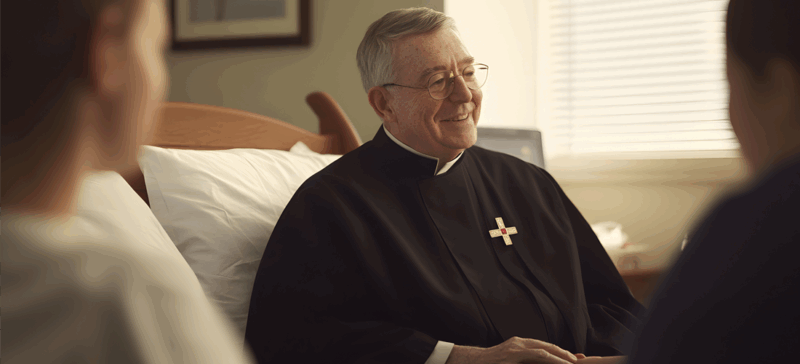When we are faced with a serious illness, palliative care offers support to help us live better lives. If a condition is life-limiting, hospice care can make people more comfortable while supporting everyone through the dying process.
At some point in life, health can take a turn that makes our days very challenging. Palliative care and hospice care are related services that aim to keep us in control and raise the quality of life through difficult circumstances. Both are holistic, meaning they offer care for mind, body, and soul.
Palliative Care
Palliative care is a type of healthcare that supports individuals who have a serious illness that is very hard to live with. A multi-disciplinary approach incorporates many roles, including medical professionals, social workers, physical and occupational therapists, and chaplains. The team provides comprehensive support for medical, social, emotional, and spiritual needs. “The organized services available through palliative care may be helpful to any older person having a lot of general discomfort and disability,” explains the National Institute on Aging.
The goal of palliative care is to manage symptoms and keep a person feeling comfortable, improving quality of life. For example, the care team can help manage pain, sleep problems, breathing difficulties, depression, or anxiety. They can help solve practical issues related to care.
Spiritual support is important, too: “Regular visits with a chaplain, religious leader or other spiritual advisor can be a helpful part of processing your illness’s impact on your life,” explains the Cleveland Clinic.
Family support is also key to the care approach, and palliative care can improve caregivers’ quality of life. A specialized palliative care team can also help families coordinate all the parts of medical care and navigate healthcare decisions.

Palliative care may be an option for someone who has a serious condition like cancer, dementia, chronic obstructive pulmonary disease (COPD), heart failure, or a debilitating neurological condition. Explains the Cleveland Clinic, “Many people opt for palliative care once they receive a serious diagnosis.”
Palliative care is often a home-based service. It can also be provided to someone who is living in a nursing home. It starts with a referral from your doctor and is covered by many forms of insurance.
Palliative care can ease stress and keep people more comfortable. A recent study in Indiana showed that people living with dementia and receiving palliative care were much less likely to visit emergency departments or be hospitalized. Their needs were addressed smoothly at home. In all, palliative care adds a specialized layer of support to help individuals and families deal with the toll of serious illness and improve their lives.
Hospice Care
Hospice care is end-of-life care. It can be immensely valuable when a person is facing a life-limiting illness and is no longer choosing or receiving treatment to cure it. “Hospice aims to provide comfort and peace to help improve quality of life for the person nearing death,” says the National Institute on Aging. It is recommended when a person has a life expectancy of 6 months or less.
The healthcare we are most familiar with aims to “fix” or cure conditions. Hospice care is different because it focuses instead on providing comfort, helping individuals and families deal with the end-of-life journey. The team may help with advance care planning and may also provide grief support following the death of a loved one.

Like palliative care, hospice involves a specialized care team that may include medical professionals, social workers, physical or occupational therapists, and chaplains. The team can help with a variety of needs and decisions that come up near death. For example, people who choose hospice care have better pain management than people who don’t. They are also “less likely to undergo tests or be given medicines they don’t need,” says the National Institute on Aging.
Spiritual support can take on special importance near the end of life. Explains the National Institute on Aging, “Spiritual needs may include finding meaning in one’s life, ending disagreements with others, or making peace with life circumstances.” Some people call on their faith traditions, such as prayer or music, to find peace. Others may wrestle with their beliefs, says the National Institute on Aging. Hospice chaplains support people through a wide range of spiritual needs, meeting people where they are.

Hospice care is covered by most insurance plans, including Medicare. It can be provided wherever a person calls home, including in a nursing home. It can also take place in a specialized hospice care unit. An advantage to home-based hospice care is that it keeps a person in a familiar setting, often with important loved ones nearby.
Choosing Hospice Care
Many people hesitate to choose hospice care, even when it might give them relief. It can be extremely hard to face the idea that life is coming to an end. Some people also fear that choosing hospice may bring death sooner. This is not true. Just the opposite—hospice care can extend life, while also making it much more comfortable. Turning to hospice care during the months or weeks ahead of death can help people live their best lives.
Important Conversations
A key idea of hospice care is honoring each person’s values and wishes. “The end of life may look different depending on the person’s preferences, needs, or choices,” says the National Institute on Aging.
Talking about dying is hard for most people. An initiative called The Conversation Project helps individuals and families identify what they value and share their wishes through the end of life. A free “What Matters to Me” workbook can help families talk through choices and plan for decisions that may come up.

When someone faces a serious illness, palliative care can ease the burden. Likewise, near the end of life, hospice care helps dying individuals live their best lives and find more peace through this difficult time.

